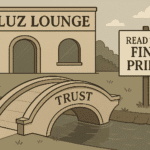Efficient IT Market
Why America Loses the King of IT Throne If We Don’t Change

Trust is a double-edged sword. If you trust in the right things and the right people, you can accomplish much more than you ever could alone. In falling for myths and liars, you fail not only yourself, but also all those who trusted you. Today’s subject is how our misplaced trust eats away at the crown jewels of American industry – putting IT services on the same complacent path that greatly contributed to the last mainstay of the country’s wealth — auto manufacturing. As Michigan faces 20% unemployment and draws its lifeblood from government bail-outs, the U.S. auto industry is facing its mortality without taking us back to the Jetsons future. Instead of flying Deloreans, we got the Canyonero.
The story is a long one, but if you leaf back a bit before Chapter 11, you’ll find misplaced trust highlighted and triple-underlined. The UAW and big 3 trusted in their eternal entitlement to our pocketbooks and banded together to fight challenges to their complacency such as tougher mileage standards and free trade. Consumers trusted that American ingenuity will find a way as long as we kept buying domestically. Voters cheerfully approved import quotas to mask the stench of stagnation and trusted that if what was good for GM wasn’t good for the country, it was at least good for Detroit. And everyone trusted that the worst thing was for this failure to be exposed and corrected, hence the subsidies, protections and bailouts that continue to this day.
The question is, will our IT world – at least the B-to-B side of it – see the same fate before we see a truly impartial market for it? I hope not, but if we don’t want to see Silicon Valley turn into Detroit, we need to sharpen our instincts and stop trusting IT industry myths. As with the auto industry, these myths sprout on all sides:
- Sellers trust that three layers of schmoozers and regular injections of FUD will keep their cash cow accounts profitable indefinitely, so they can put innovation on the back burner
- CFOs and CEOs trust IT to build a competitive advantage but put sourcing of IT services on par with procurement of paper clips
- Buyers trust in strategic partners, magic bullets, and mystical quadrants despite years of disappointment
And just as with the car industry, the biggest fear is not failure, but being exposed – exposed as having spent too much or hitched your trailer to the wrong vendor or having fallen behind someone who was too small or too foreign to be a real threat. But although some people have trouble remembering it, being fooled once is ok. So in that spirit, I’ll cop to my mistakes first. I entered the IT business in co-location in ’96 with Exodus. Starting from 25 people, we became the darling of industry and analysts once we hit $600 mm and 3,500 people in less than 3 years, to be followed shortly by a spectacular collapse into Chapter 11. Granted, we changed the game and the assets became some of the most important data centers in IT today. I then took another roller coaster ride on the buy side, helping build a forerunner to Hulu and YouTube called the Digital Entertainment Network, which blew $72M in just over a year before imploding. Right concept, wrong time, wrong combination of people. In both places, I saw layers upon layers of inefficiency, waste, and hype centered around how IT was bought, sold, and provisioned.
I thought we could do better, which is why I started RampRate, which has lasted longer than the last 2 gigs combined. So here I am 10 years later with the same pursuit of a fluid trustworthy market. I think we can get our heads on straight and avoid the auto industry’s fate, but we still need to slay some dragons, which is why I’m compiling the master list of IT myths that we’ll need to overcome. If you want to add to the pile, or learn from mistakes of others instead of your own, or, for that matter, tell me why the good times will never end, come on down.













Tony, per our IM exchange, I think this is a weak metaphor. The vector of innovation in IT is much steeper than in the auto industry – it's much easier to work with bits than atoms. Sure – there's waste and inefficiency everywhere and there are plenty of opportunities to improve things, but I think you need to go a lot deeper here if you want to make the argument. Oh – and crappy management exists every!
Brad, be it a weak metaphor, but not as weak as the IT decision making process. You have been investing in successful internet and IT companies for longer than I have been writing emails. How could things be changed? What will create a more fluid market for IT? Thanks for your comments.
Tony, is the master list that you are compiling the three bullets above? If it is, then I think the common thread is that many people want someone else to be the expert and want to assume that those experts are doing their 'expert thing' in the background. If the organization is lead by an IT person or is working with someone knowledgable in it (a la RampRate), then they will get it right. If it isn't lead by an IT person, and the leadership views IT as a cost of doing business rather than a source of competitive advantage, then it won't be optimized or evolve as the world around it changes.
If you are trying to proselytize for greater understanding of the situation, I think you need a bigger forum. Is this what you are covering at Harvard?
ndeed, and agreed.
"CFOs and CEOs trust"
A good captain of a ship needs to not fear their crew, and not just do I believe they fear IT, but because it "appears" to be less about rocket science and more about process, leaders often pretend to understand it, and definitely don't want to appear "not to" because of this. CFO's do more damage than anyone (in this domain especially), and not just for the same reason of fear, but also by not applying text book 101 economics to this. They will agree to buy things that are outrageously expensive, or bleed a company dry on a single word from a server-room "wizard."
I think you just gave me my next talk. "IT…WTF!, for CEOs & CFOs"
Great blog bout #IT & compacency. http://bit.ly/98zbwV
Great blog about #IT and Complacency: http://bit.ly/98zbwV
Let me refer to the relationship between clients and contractors.
Prior to 2000, IT budgets were lavish and e-commerice consultancies charges exorbitant prices for the most basic of services. Flashy companies with 'cute' names basically took advantage of the booming dot-com world and corporate ignorance of the technology and often did not even meet the most basic of expectations. I have a name for these firms, it starts with 'E' and that replaces an 'A' in a derogatory team ending with 'oles'.
Now the pendulum has swung the other way completely. Companies go on price alone, often outsourcing development to offshore groups at prices that wouldn't have funded the lunch room at the consultancies in the 1990's.
The mutual distrust is so thick you can slice it.
Recently we were asked to 'fix' a major e-commerce web site, something we normally don't do … since we are focused on mobile and social apps. We initially bid $X to have 5 man team work on this in a one month timeframe. When pushed we lowered the cost to $X/2. That's a pretty small project for us, but we figured this would be a good long term relationship to have. Then they pushed back, wanting to kickoff with $X/8 and then pay $X/10 a week after that. The reason being is the last consultancy had failed to deliver anything for a considerable sum. Then the $X/8 disappeared and the $X/10 became $X/20 and so on. The relationship deteriorated from that point on and no deal was struct.
I blame the greed of the consultancies in the 1990's as the catalyst for this situation.
Here's what I see in the 'app' world. Projects that should have X amount of resources get bid out at 1/5th that amount, either offshore or to 'cookie-cutter' app factories. What gets shipped is functional but uninspired. These apps fail to even get more than a few 1000 downloads.
The quote that best sums this up is:
“There is nothing in the world that some man cannot make a little worse and sell a little cheaper, and he who considers price only is that man's lawful prey.”
– John Ruskin (English Writer and Critic of art, architecture, and society, 1819-1900)
There's more. The best project management methodology is what is know as 'agile' development: http://en.wikipedia.org/wiki/Agile_software_devel…
"Agile software development refers to a group of software development methodologies based on iterative development, where requirements and solutions evolve through collaboration between self-organizing cross-functional teams. The term was coined in the year 2001 when the Agile Manifesto was formulated."
Try to sell a development contract that is anything but 'waterfall'. That is, a SOW that outlines the exactly functions of the project based on a design created with no prototypes or 'iteration' possible.
The result? Not as great as it could be, sometimes dissapointing. The cause? Lack of trust.